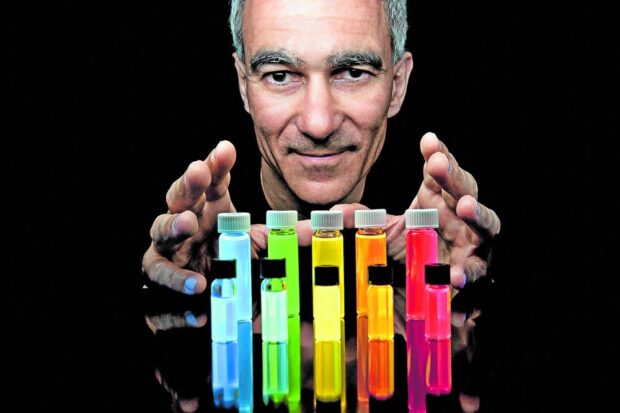
MAN OF SUBSTANCES An image obtained from the Massachusetts Institute of Technology (MIT) shows MIT chemist Moungi Bawendi, winner of the 2023 Nobel Prize in Chemistry. The French-born Bawendi, Louis Brus of the United States and Russian-born Alexei Ekimov won the prize for research in semiconductor nanocrystals known as quantum dots. —AFP
WASHINGTON—Talk about bouncing back.
Massachusetts Institute of Technology professor Moungi Bawendi is a cowinner of this year’s Nobel chemistry prize for helping develop “quantum dots”—nanoparticles that are now found in next-generation TV screens and help illuminate tumors within the body.
But as an undergraduate, Bawendi flunked his very first chemistry exam, recalling that the experience nearly “destroyed” him.
The 62-year-old of Tunisian and French heritage excelled at science throughout high school, without ever having to break a sweat.
But when he arrived at Harvard University as an undergraduate in the late 1970s, he was in for a rude awakening.
“I was used to not having to study for exams,” he told reporters on Wednesday, adding that he was intimidated both by the enormous size of the hall and the stern presence of a proctor.
“I looked at the first question and I couldn’t figure it out, and the second question I couldn’t figure it out,” he remembered.
In the end, he scored 20 out of a 100, the lowest grade in his entire class.
“And I thought, ‘Oh my god, this is the end of me, what am I doing here?’”
Though Bawendi loved chemistry, he realized he hadn’t learned the art of preparing for exams, something he quickly set about rectifying.
“I figured out how to study, which I didn’t know how to do before” he said, and after that “it was 100s on every exam, pretty much.”
‘Persevere’
His message for young people is simple: “Persevere,” and don’t let setbacks “destroy you.”
“It could easily have destroyed me, my first experience with an F, the lowest grade in my class by far,” he added.
Quantum dots are nanoparticles so tiny their properties, including color, are governed by quantum mechanics.
Though he didn’t discover them, Bawendi revolutionized the techniques to manufacture them with precision and at scale, paving the way for their applications today.
French-born Bawendi is part of a trio of US-based researchers including Louis Brus of the United States and Russian-born Alexei Ekimov that won the Nobel Chemistry Prize on Wednesday for developing tiny “quantum dots” used to illuminate TVs and lamps, hours after a prematurely released statement revealed their names.
They brought advances on tiny particles that “now spread their light from televisions and LED lamps, and can also guide surgeons when they remove tumor tissue,” the jury said.
But a rare leak led to the winners’ names being mistakenly sent to media outlets hours before they were officially announced, prompting an apology from the awards’ overseers.
Hans Ellegren, secretary general of the Royal Swedish Academy of Sciences, said a press release had gone out for “still unknown reasons.